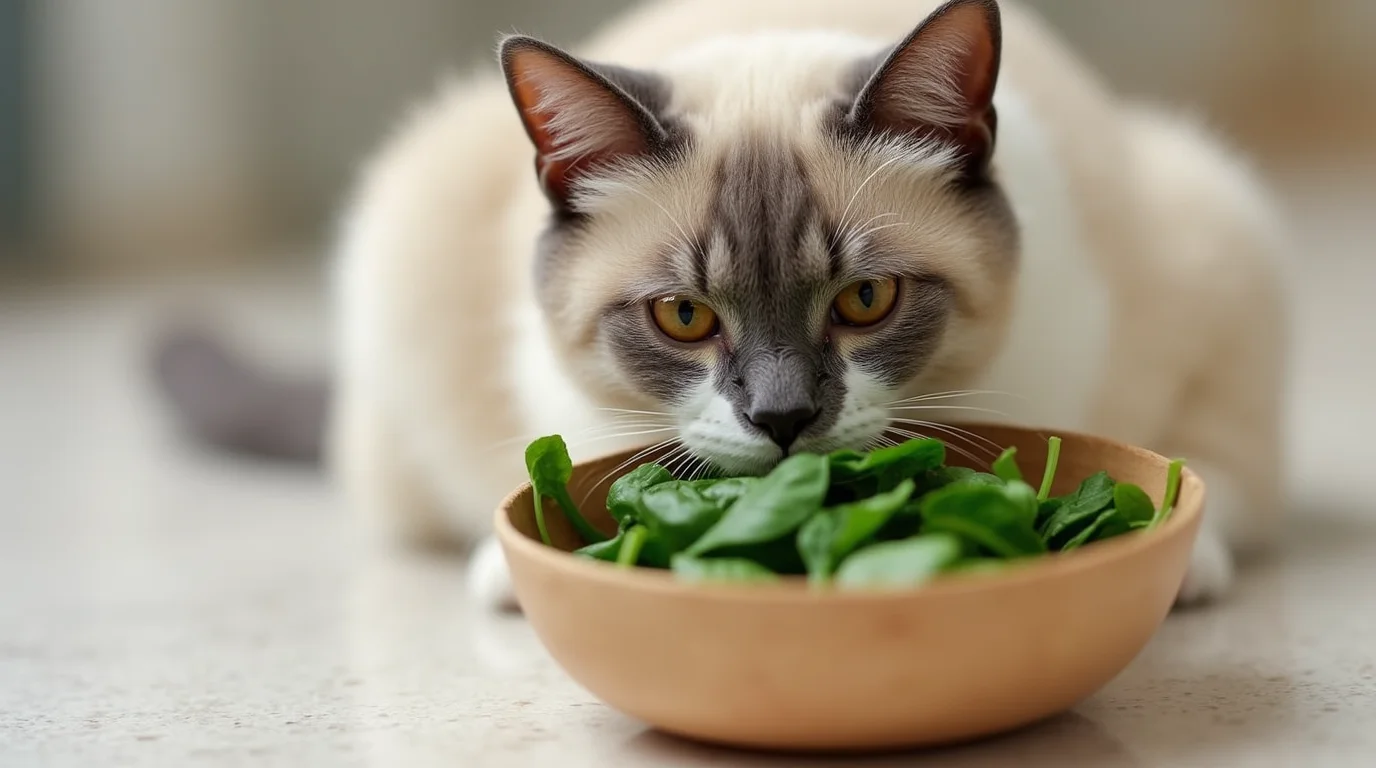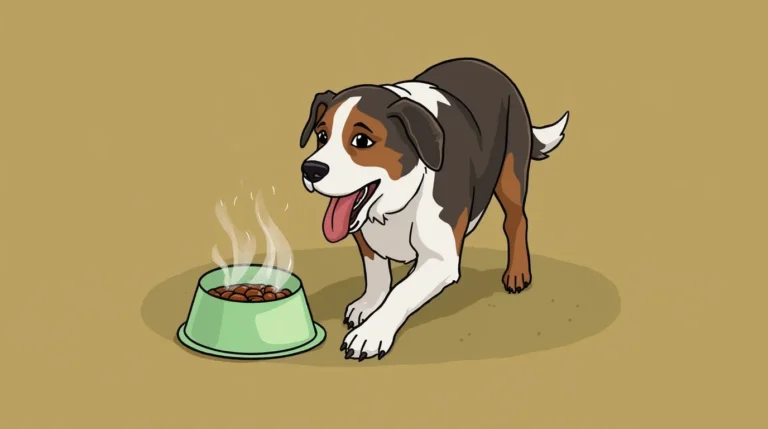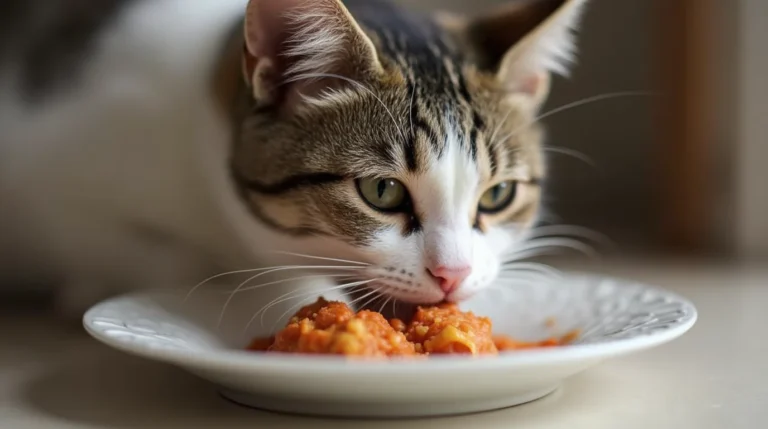Table of Contents
Cats are naturally curious creatures, often showing interest in what their owners eat. If you enjoy spinach, you may wonder: Can cats eat spinach? The answer is yes, but with caution. While spinach is not toxic to most cats, it may not be suitable for all felines, especially those with certain health conditions.
In this guide, we will look at the benefits and risks of feeding spinach to cats. We will also discuss the best ways to serve it while keeping them safe and healthy.
Can Cats Eat Spinach Safely?
Yes, cats can eat spinach in small amounts, but not all cats should. Spinach has vitamins and minerals that can be good for cats. However, it also contains oxalates. These oxalates can lead to kidney and bladder stones in some cats.
Before you feed your cat spinach, you should understand when it is safe and when you should avoid it.
Nutritional Benefits of Spinach for Cats
Cats are obligate carnivores, meaning they need meat for most of their nutrients. However, small amounts of spinach can offer some health benefits.
1. Rich in Vitamins
Spinach is packed with vitamins A, C, K, and folate, which support overall health and immune function.
2. High in Fiber
The fiber in spinach may help with digestion and bowel movements, especially for cats with mild constipation.
3. Contains Antioxidants
Spinach contains antioxidants that help fight cell damage and inflammation, promoting overall well-being.
4. Low in Calories
For overweight cats, spinach can be a low-calorie treat option when given in moderation.
While these benefits are great, they do not outweigh the risks for some cats—especially those prone to urinary problems.
Risks of Feeding Spinach to Cats
1. Can Contribute to Kidney and Bladder Stones
Spinach contains oxalates, which can lead to calcium oxalate crystals in the urine. If a cat tends to develop urinary tract infections (UTIs) or bladder stones, you should avoid spinach.
2. Digestive Upset
Cats have sensitive digestive systems, and too much spinach can lead to:
- Diarrhea
- Vomiting
- Stomach discomfort
3. Not a Necessary Part of a Cat’s Diet
Since cats are carnivores, they do not need vegetables to meet their nutritional needs. While spinach is safe for some cats, it does not provide any essential nutrients that they cannot get from meat.
How to Safely Serve Spinach to Cats
If you decide to offer your cat spinach, follow these safety tips:
1. Serve in Small Portions
A tiny amount (a few leaves or a small chopped portion) is enough. Avoid feeding large quantities.
2. Cook It First
Raw spinach contains higher oxalate levels, so steaming or boiling it reduces the risk of urinary issues.
3. Avoid Seasonings
Never serve spinach with salt, butter, garlic, onions, or other spices, as they can be toxic to cats.
4. Monitor for Reactions
If your cat experiences vomiting, diarrhea, or discomfort after eating spinach, stop feeding it immediately.
Can Kittens Eat Spinach?
No, kittens should not eat spinach. Their kidneys are still developing, and consuming oxalates may increase the risk of urinary problems.
Can Cats Eat Raw Spinach?
Avoiding raw spinach is better. It has more oxalates, which can lead to urinary crystals and stones. Cooked spinach is a safer option.
Can Cats Eat Spinach Every Day?
No, spinach should only be an occasional treat, not a daily food. Too much spinach can increase the risk of urinary issues over time.
Can Cats Eat Spinach Leaves or Stems?
Yes, both the leaves and stems of spinach are safe, but the stems can be tough for cats to chew. If feeding spinach, chop it finely to make it easier to eat.
Who Should Avoid Feeding Spinach to Cats?
Cats with the following conditions should not eat spinach:
- History of bladder or kidney stones
- Urinary tract infections (UTIs)
- Kidney disease
- Digestive sensitivities
If your cat has any of these health issues, it’s best to avoid spinach entirely.
Healthier Alternatives to Spinach for Cats
If you’re looking for safer, cat-friendly vegetables, consider these options:
- Pumpkin – A good fiber source that aids digestion.
- Carrots – Cooked and soft, they are safe in small amounts.
- Green Beans – Low in oxalates and safe for cats.
- Zucchini – A mild vegetable that is easy to digest.
Vegetables Cats Should Avoid
Some vegetables are toxic or unsafe for cats. Never feed your cat:
- Onions and Garlic – Can cause anemia.
- Leeks and Chives – Harmful to red blood cells.
- Tomatoes – Unripe tomatoes and tomato plants are toxic.
- Mushrooms – Some mushrooms contain harmful toxins.
Frequently Asked Questions
1. Can cats eat spinach in cat food?
Yes, some commercial cat foods include small amounts of spinach as an ingredient. However, the quantity is usually exceedingly low and does not pose a risk.
2. Can cats eat spinach dip?
No, spinach dip contains dairy, garlic, salt, and other ingredients that are harmful to cats.
3. Can spinach help cats with constipation?
In small amounts, spinach’s fiber may help with digestion, but too much can cause diarrhea.
4. What should I do if my cat eats too much spinach?
Monitor for symptoms like vomiting, diarrhea, or signs of discomfort. If symptoms persist, contact your veterinarian.
5. Do cats even like spinach?
Some cats may show curiosity about spinach, but most do not feel naturally attracted to vegetables.
Conclusion
So, can cats eat spinach? Yes, but only in small amounts and only if they are healthy. Spinach has some vitamins and fiber. However, it can cause urinary stones in cats with kidney or bladder problems.
If you choose to give your cat spinach, always serve it cooked, unseasoned, and in moderation. If your cat has any urinary health concerns, it’s best to avoid spinach altogether.
As always, when introducing new foods to your cat’s diet, consult your veterinarian to ensure it’s safe for your pet.







